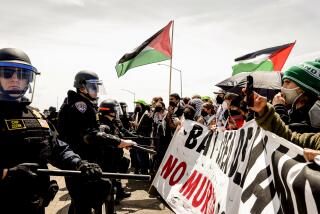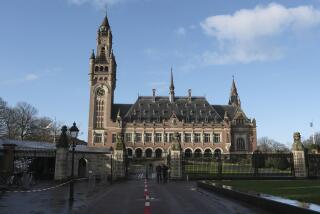High Court Hears Groupsâ Petitions on Israeli Barrier
JERUSALEM â Human rights groups took their case against Israelâs separation barrier to the nationâs Supreme Court on Monday, after officials suggested that they might alter the dividerâs snaking course to consume a smaller portion of the West Bank.
A three-judge panel did not issue a ruling after hearing petitions brought by two Israeli groups that claimed the fence was disrupting the lives of thousands of Palestinians who had found themselves cut off from farms, schools or family members by the construction.
The court session came two weeks before the International Court of Justice in The Hague was scheduled to hold its hearing on the project at the request of the United Nations Security Council. It was not clear whether the Israeli court would rule by then.
Although other cases involving the barrier have been taken to Israelâs highest court, the petitions brought Monday were the first to challenge the project broadly and not to center on individual grievances.
The rights groups charge that the more-than-400-mile-long structure, about a quarter of which has been completed, violates the rights of thousands of Palestinians who will be walled off from their crops or end up living between the Israeli border and the fence as the latter winds through the West Bank.
âWeâre not against the barrier,â said Avner Pinchuk, an attorney for the Assn. for Civil Rights in Israel, one of the groups that raised the challenge. âWeâre against a barrier that goes inside Palestinian population centers, or their fields.â
Government attorney Malkiel Blass said the route or enforcement of restrictions on Palestinians could shift soon.
âAs for the parts of the fence which havenât yet been built, we are reexamining them on the basis of our past experience to see if thereâs a possibility to change the route and to reduce the damage to the Palestinian population,â he told reporters.
As for sections already standing, Blass said, âwe are checking whether there are possibilities to relieve the population, to ease the passage through the gates, to extend the opening hours, to allow cars to pass, things which will allow things to flow better without undermining the security.â
The hearing came after Israeli officials said they were working to draw a new route for the barrier -- a series of fences, walls, trenches, patrol roads and electronic surveillance equipment -- to reduce the harm to Palestinians.
By moving the structure so that it cuts less deeply into the West Bank, Israel also hopes to make the project more palatable to U.S. officials, who have objected to its meandering route through land that Israel captured during the 1967 Middle East War and that the Palestinians claim for a future state.
Israeli Prime Minister Ariel Sharon hopes to travel to Washington in coming weeks to meet with President Bush.
Israeli officials defend the barrier -- which continues going up as the legal challenges proceed -- as an effective method to prevent suicide bombers from making their way onto Israeli soil to carry out their attacks. Security officials say the barrier has led to a decrease in terrorist attacks since last summer.
But the project also has generated international concern and angered Palestinian officials, who view it as a way for Israel to draw a de facto border and take land without negotiations.
In response to the construction, an associate of Palestinian Authority President Yasser Arafat said Monday that officials were considering declaring the Palestinian Authority âthe sole party in chargeâ of the areas held by Israel since the 1967 war, including the West Bank, Gaza Strip and East Jerusalem.
Yasser Abed-Rabbo, a former Palestinian information minister, said making a unilateral declaration was one way to thrust the Palestinians back into the discussions over the dividerâs route and to attract international support. But he said it was only one of the options discussed by Palestinian leaders.
Abed-Rabbo said Palestinians should not wait âuntil after the separation wall and other forms of incarceration of Palestinians are already built.â
Sharon has said he will move ahead with fence-building and is considering a series of unilateral moves in case he determines that efforts at diplomacy under the U.S.-backed âroad mapâ have failed.
The prime minister has said he may cut ties with the Palestinians, removing some isolated Jewish settlements and focusing his forces along a security line that he has yet to define under a âdisengagement plan.â
Last week, he said he would consider evacuating 17 Jewish settlements in the Gaza Strip. The proposal has created upheaval inside his right-wing Likud Party, many of whose members are staunch defenders of the settlements.
More to Read
Sign up for Essential California
The most important California stories and recommendations in your inbox every morning.
You may occasionally receive promotional content from the Los Angeles Times.










